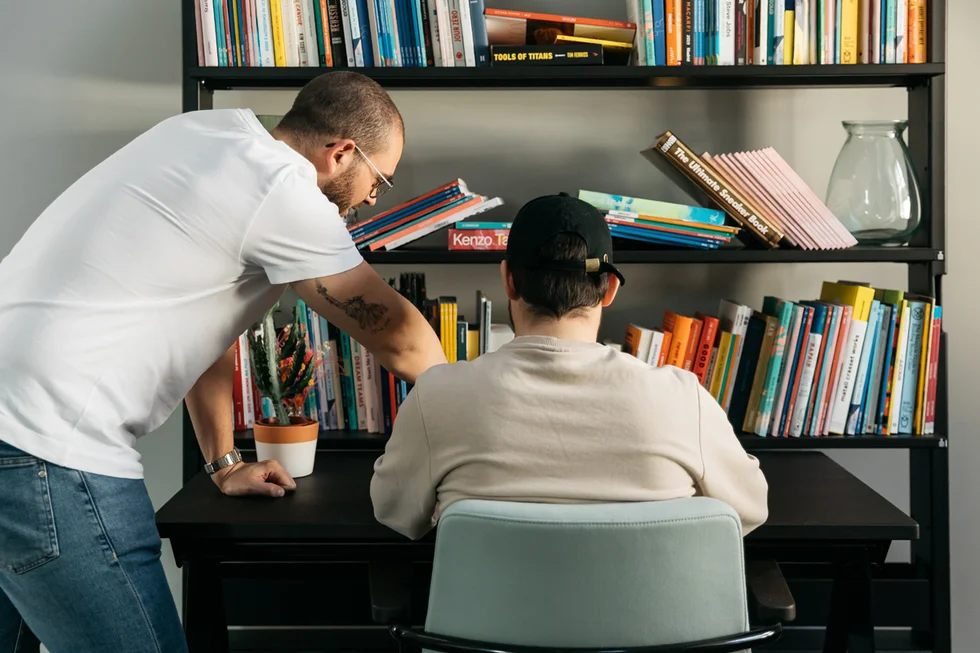8 coaching techniques to prepare for job interviews
Sep 29, 2022
7 mins


Rédacteur & Photographe
Getting through an interview is a bit like running a marathon. You can’t just run 26 miles off the bat. Your body needs the training to go the distance. It takes strength of mind, perseverance, and a healthy diet. You have to put in the work. An interview is much the same, but for some reason, it’s become a life event we fear. Of the many, capable competitors in the race, only one will emerge victorious, and to do that you need to thrive in adversity, perform to the best of your ability, and stand out.
What’s the best way to practice for a job interview to ensure you perform at your best? Follow these tips from professional coach Marie-Laure Deschamp:
- Rehearse in front of a mirror or film yourself
- Get your family and friends involved
- Get help from a pro
- Put yourself in the recruiter’s shoes
- Test your skills with a simulator
- Try the 1-3-5 pitch challenge
- Demystify the recruiter
- Practice active listening
Job interviews: why you need to practice
To get ready for a job interview you need to focus on both “style and content,” says Deschamp. “Everyone has their own reasons to practice,” she explains. Some want to work on their self-confidence, others want to learn how to make their conversation more interesting or put an end to those ‘ums’ and ‘uhs’. Practicing is about being prepared and focussing your energy to get the job offer. According to Deschamp, “You need to turn up for a job interview aware of your strengths but also your own limits. You should feel good about yourself, and know that you’re what they’re looking for.” Then there’s no reason for it not to work out. “The goal is to show yourself in your best light,” she continues, “Occasionally you’ll be faced with a difficult recruiter who’s trying to catch you out. That’s another reason to practice: to prepare for the worst. If you plan for it you’ll know how to bounce back. A runner checks out their route in advance, and plans for obstacles. Good training for a job interview will help you feel more self-assured.”
How to practice
1. Rehearse in front of a mirror or film yourself
“Are you smiling? Speaking slowly enough? Articulating? Avoiding ‘ums’ and uhs’?” That’s the sort of thing you can pick up on when you take a closer look at your interview skills. “Filming yourself or practicing in front of a mirror gives you the chance to see what others see,” says the coach. “It can help you take a step back and correct yourself.” You can then be more open with your body language and replace those ‘ums’ with silences or attempt a smile. “It’s a really useful technique for people wanting to improve their speaking performance. Be warned it’s not going to be a positive experience if you have a negative self-image or tend to undervalue yourself because you’ll be overcritical, put yourself down, and only see the negatives.”Top athletes often analyze their performance, so it might be worth a try.
2. Get your friends and family involved
Practicing with someone you know is a popular choice. Start with your partner, they’ll always be first in line to cheer you on with a “You can do it!” Then get a good friend involved, the sort who’ll be kind and say, “It’s not so bad, at least we still love you.” Try your Uncle Tony who works in the industry, “It’s a dog eat dog sector—you need to show your teeth or you’ll be a goner! Come on!“ Or even your lovely mom, who’s always been there to help you revise for tests.
“Practicing with a loved one is a great way to hone your skills in front of someone else and get ready for the interview,” explains Deschamp. “It helps you expand on what you want to say and express it clearly. Once again, it does depend on who you ask. They’re unlikely to have in-depth knowledge of your profession or the same vision for recruitment. This training method works wonders on your style, but isn’t as helpful for content.” If you choose to be coached by a friend or family member, “Take the feedback with a grain of salt,“ cautions Deschamp. Think about your relationship with them. “An encouraging person who tends to big you up might find it hard to give constructive feedback,” she continues. “On the other hand, someone who views you more critically might damage your self-confidence.” Don’t pick just anyone, think about it carefully.
3. Get help from a pro
“If you don’t feel like practicing alone and you need support,” says Deschamp, “Professional help is a good idea.” It makes sense really—you wouldn’t train for a marathon with your little brother who only runs to the store if he has to! It’s exactly the same when it comes to work. Whether you use a professional coach or mentor, a true professional will encourage you to be objective about your career history. “By getting a clear view,” she explains, “you’ll be able to identify your skills and highlight your strengths. The aim is to work on how you see yourself and develop self-confidence. Then you’ll be able to tell your story to your benefit.”
4. Put yourself in the recruiter’s shoes
Whether you’re prepping for a marathon or a job interview, the waiting fuels your fear. You project your doubts onto the event and worry that the recruiter will find you, “Incompetent, mediocre, or somehow lacking.” The self-sabotage begins before you’ve even started running! The recruiter isn’t usually out to get you, quite the opposite. Remember, they’re looking at you through the lens of their own needs.
“Try putting yourself in their shoes,” suggests our expert, “Ask yourself, if I were the HR Manager or Company Director, what sort of person would I want for this job? What would I expect from them?’” Have a bit of fun coming up with answers for questions the recruiter might ask themself. It will help you anticipate the questions you’ll be asked and give you a better understanding of the challenges you’ll face. Then you know how to meet their needs. “You’ll look at the interview differently,” says Deschamp. “It comes down to what you know about the job. Is it right for you? It helps you understand which parts of your career history to highlight!“
5. Test your skills with a simulator
Did you know that job interview simulators were a thing? A bit like running on a treadmill, these machines can simulate tricky terrain, set the pace, and test your resistance. Obviously, a machine can never completely recreate an interview, but it can help you to get ready for one. Much like fitness training, you can now find online training to prepare for the barrage of questions that might be asked by a recruiter; questions about your skills, motivation, and personality. “Practicing answering questions is useful,” says Deschamp, “It trains our brains and emotions to be better prepared for an interview and anticipate difficult situations. You need that element of surprise. The more you practice interviews, the more comfortable and confident you’ll feel”
6. Try the 1-3-5 pitch challenge
“Often during an interview, a recruiter will utter the classic, ‘So tell me a bit about yourself,’ or ‘Tell me about your career so far,’ This means they’re giving you a chance to talk freely and showcase your profile. The problem is, when put on the spot, we tend to get hung up on details that are already on our resume and forget to volunteer new or more personal information. A good way to prevent this is to practice replying with different answers. It’s what I call a ‘drawer pitch’ or ‘1-3-5 pitch’. You reply to the question in 1, 3, or 5 minutes.” Long distance runners switch up short, medium, and longer stints when they train, so the technique can surely be applied in other situations.
7. Demystify the recruiter
When we get an interview we set the bar high. So high that it seems impossible to get over; stress quickly takes hold. “We have to demystify interviews,” encourages Deschamp, “Putting the recruiter on a pedestal is a bad idea. We tend to make assumptions about the person interviewing us and all too often, this does us a disservice.” In addition, many of us spend the entire interview looking for signs of failure. The recruiter glances out the window, says a surprised ‘Oh really?’, raises their eyebrows, or doesn’t say ‘goodbye’ as you expected. Everything is subject to interpretation. “A candidate who thinks they’re going to fail is prone to self-sabotage,” explains Deschamp. “To avoid getting into this negative spiral, you have to start on the right foot. Before the interview, tell yourself you know absolutely nothing about the person opposite you. Maybe they’re going through some personal stuff? Maybe they’re tired? Maybe they don’t like their job? Whatever the case, jumping to conclusions is pointless.” Stay focussed on your goal and don’t let anything you can’t control affect it. A change in the weather isn’t going to stop a marathon runner from giving it their all.
8. Practice active listening
Ignoring this tip is a fatal mistake. The interview starts and you’re so stressed that you blurt everything out in one breath. The problem? You don’t let the recruiter say what they want to. “In an interview, we tend to want to talk about ourselves,” the coach reveals. “We forget there are two people in the room. But acing your interview also means listening to the other person!” When you hear ‘Tell me a bit about yourself,’ it can lead to confusion. An interview should still be a two-way process. It’s like a relay! “The recruiter will likely take the time to tell you about the company, the job you’ve applied for, and its challenges,” says Deschamp. “This is when you really need to listen and pay attention to what you’re being told. You never know when a ‘What do you think?’ might pop up! Be prepared and make a few mental notes about what they’re saying. Take note of keywords or figures for example. That way if they ask you about it, you’re not limited to quick answers. Take the time to think and analyze the situation. You’re allowed to pause and stay silent for a moment and you can always ask for the question to be clarified. It’s proof that you know how to stand up for yourself!” And that you’re not going to rush in like a bull in a china shop!
Practice being yourself
Our coach has one final tip for the road: “I think the most important thing is, to be honest,” says Deschamp. “Don’t try to fit into a box at all costs. It will become a lie. If you pass yourself off as someone else, you risk having to eternally deceive your manager or constantly battling in a job that isn’t you. Ultimately you’ll suffer. Being yourself is about being natural.” If you’re confident about who you are and the role feels aligned with your goals, there’s no reason that you won’t end up a winner! Deschamp reminds us to, “Adapt to your interview partner as a working relationship is built by both sides—it’s all about balance.”
Take a tip from Aesop’s Fables, “Slow and steady wins the race.” Being prepared for your job interview puts you in pole position. Your calm demeanor will double your chances of achieving your goal. Don’t overdo it though: in an interview, just as in a race, overtraining can end in disaster. “If we over-prepare we risk being thrown by anything unexpected,” warns the coach. Move at your own pace, little by little. Trust yourself and above all, remember who you are!
Translated by Debbie Garrick
Photo: Welcome to the Jungle
Follow Welcome to the Jungle on Facebook, LinkedIn, and Instagram, and subscribe to our newsletter to get our latest articles every day!

More inspiration: Job interview survival guide
Ace your job interview with our comprehensive guide. From preparing for different recruiters to managing informal moments, our tips and techniques will help you shine.

Beyond the basics: advanced strategies for researching a company before an interview
Want to show off your knowledge and impress the recruiter? Don't skip out on the in-depth researching stage of preparing for an interview!
Mar 29, 2023

Interview faux pas: 10 mistakes you didn't know you were making
Want to ace your next job interview? Here are 10 common mistakes to avoid, according to career expert Alan Stein.
Mar 21, 2023

People-pleasing in an interview: how a minion mentality can derail your career
"Yep, sure, no problem, I can do that!" People pleasers, beware. Overselling yourself to the recruiter could come back to bite you...
Dec 13, 2022

Interviewing with a friend: the pros, the cons, and how to handle it
Thanksgiving is the perfect time for catching up with loved ones, eating great food, and ... networking?
Nov 22, 2022

The secret art of selling yourself in an interview
Beyond convincing the recruiter your skills and experiences are relevant, you need to be able to sell YOU. A personal branding expert shares his tips.
Nov 10, 2022
The newsletter that does the job
Want to keep up with the latest articles? Twice a week you can receive stories, jobs, and tips in your inbox.

Looking for your next job?
Over 200,000 people have found a job with Welcome to the Jungle.
Explore jobs